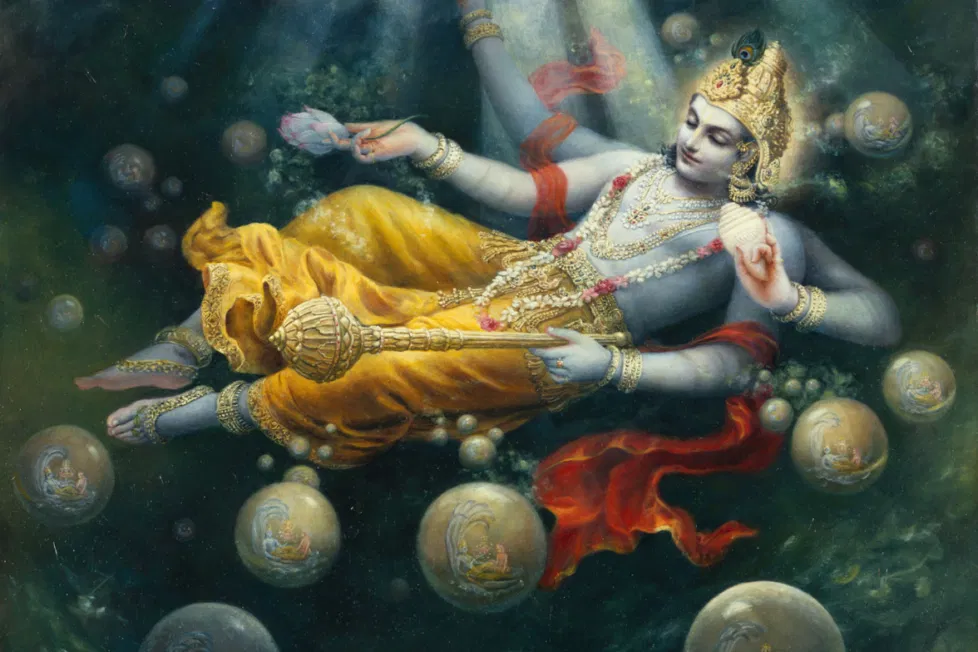Explore Gotras

Narayana: The Supreme Being in Vaishnavism
Narayana is revered as the Supreme Being in Vaishnavism, embodying the ultimate reality and the source of all creation. His significance permeates various Hindu scriptures, symbolizing divine wisdom, cosmic order, and the path to liberation.
1. Origins and Lineage
Narayana in the Vedic Tradition:
In the Rig Veda, Narayana is identified as the sage to whom the Purusha Sukta was revealed, highlighting his profound spiritual stature. The Purusha Sukta, a hymn dedicated to the cosmic being, underscores Narayana’s association with the universal spirit and the foundational aspects of existence.
Divine Lineage:
Narayana is often associated with Lord Vishnu, representing the preserver aspect of the Hindu trinity. As an embodiment of Vishnu, Narayana’s lineage is divine, transcending mortal ancestry and symbolizing the eternal nature of the cosmos.
2. Narayana’s Role in Hindu Mythology
Supreme Deity:
Narayana is venerated as the Supreme Being in Vaishnavism, embodying the ultimate reality and the source of all creation. His significance permeates various Hindu scriptures, symbolizing divine wisdom, cosmic order, and the path to liberation.
Association with Nara-Narayana:
Narayana, along with Nara, is part of the divine sage duo Nara-Narayana. They are considered partial incarnations of Vishnu, residing in Badrinath and engaging in penance for the welfare of the world. Their presence signifies the unity of the human and the divine in the pursuit of righteousness.
3. Narayana’s Contribution to the Vedic Tradition
Revealer of Sacred Hymns:
Narayana is credited with the revelation of the Purusha Sukta, a significant hymn in the Rig Veda that describes the cosmic being. This association emphasizes his role in conveying profound spiritual truths and guiding seekers toward understanding the nature of the universe.
Influence on Upanishadic Thought:
The Subala Upanishad, a Vaishnava text, extols Narayana as the Supreme Being, equating him with Brahman, the ultimate reality. This identification reflects Narayana’s central role in the development of Vedantic philosophy and the emphasis on devotion as a means to attain liberation.
4. Narayana’s Role in Hindu Tradition
Embodiment of Dharma:
Narayana represents the embodiment of dharma (righteousness) and cosmic order. His actions and teachings serve as a guide for adherents to live a life aligned with spiritual principles and moral integrity.
Inspiration for Devotional Practices:
As the focal point of devotion in Vaishnavism, Narayana inspires various forms of worship, including rituals, prayers, and meditative practices. His presence fosters a deep sense of connection between the devotee and the divine.
5. Narayana’s Legacy in Hinduism
Central Figure in Vaishnavism:
Narayana’s prominence in Vaishnavism underscores his enduring legacy as the Supreme Being. His attributes and narratives continue to influence theological discourse and devotional practices within the tradition.
Influence on Bhakti Movement:
The emphasis on personal devotion to Narayana contributed to the Bhakti movement, which advocated a direct and emotional connection with the divine. This movement played a pivotal role in shaping the religious landscape of India.
6. Narayana’s Influence in Hinduism
Integration into Various Texts:
Narayana’s presence is integral to numerous Hindu scriptures, including the Vedas, Upanishads, Puranas, and epics like the Mahabharata. His multifaceted roles in these texts highlight his comprehensive influence on Hindu thought.
Symbol of Ultimate Reality:
In philosophical terms, Narayana symbolizes the ultimate reality, encompassing both the immanent and transcendent aspects of the divine. This conceptualization provides a framework for understanding the nature of existence and the path to spiritual realization.
7. Conclusion
Narayana’s profound impact on Hinduism is evident through his central role in theology, philosophy, and devotional practices. As the embodiment of the Supreme Being, his teachings and attributes continue to guide seekers on the path of righteousness and spiritual fulfillment. His legacy endures as a testament to the enduring power of divine wisdom and compassion.
